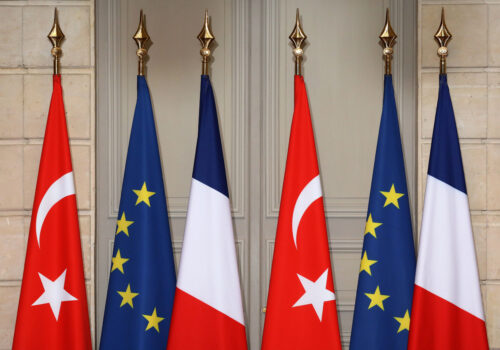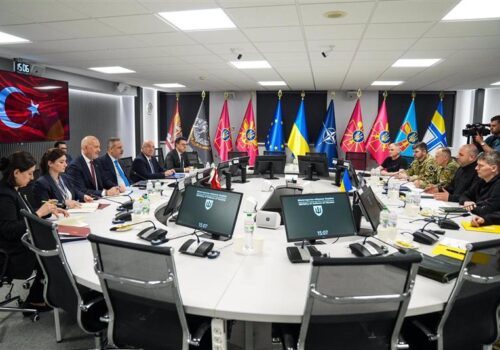On July 23, Russian and Ukrainian delegations held a third round of peace talks in Istanbul. Two days later, in the same city, representatives from the E3 countries (Germany, France, and Britain) held nuclear talks with Iran. These meetings demonstrate that many countries are increasingly regarding Turkey as both an ideal diplomatic venue and a viable partner. What might once have seemed like inconsistency in Turkey’s foreign policy—its ability to maintain ties across divides and rivalries—has somewhat unexpectedly become its greatest asset.
To be sure, Turkey’s location—in a neighborhood that has seen war in Ukraine, fighting between Armenia and Azerbaijan, the Syrian civil war, and Iran-Israel escalation—contributes to Turkey’s appeal, but it is not the sole factor. The E3 regards it as a NATO ally, Russia treats it as a strategic counterpart, Ukraine views it as a supporter, and Iran sees it as a non-hostile actor. Turkey has positioned itself as a useful, though increasingly complicated, international partner. It has served as a conduit between NATO and Russia, hosting negotiations, brokering prisoner exchanges, and preserving communication with Washington during periods of heightened tension. Today, it maintains credible dialogue with Russia, Ukraine, NATO, and Iran.
Turkey has built its complex foreign policy by deliberately pursuing strategic ambiguity and geopolitical balance, engaging closely with multiple powers. For example, Turkey maintains dialogue with Russia on energy and regional security while remaining a NATO member committed to collective defense. Additionally, Turkey engages with these powers while not fully aligning with any single bloc. For example, it continues to have longstanding disputes with fellow NATO member Greece over maritime boundaries, and its position on Cyprus diverges from that of many Western partners. In the Middle East, Turkey has at times taken independent stances regarding states such as Syria, Iraq, Egypt, and Iran, which occasionally placed it at odds with other NATO partners. At the same time, it still aspires to be a member of the European Union.
Turkey’s strategy shows that it is adapting to the new reality of an unpredictable international system, and the kind of diplomacy it practices is no longer unique. This blend of ambiguity and strategic flexibility is becoming standard among middle powers. For example, India buys arms from Russia while deepening ties with the United States; Australia relies on China economically even as it strengthens military coordination with the United States; and Saudi Arabia coordinates oil policy with Russia while opening new lines of communication with Iran and also deepening security ties with the United States.
As the world moves further away from the bipolar dynamics of the Cold War, this kind of diplomacy is likely to persist and even be adopted by more states. Unlike in the Cold War era, when countries such as Turkey often had to choose between the United States and the Soviet Union, today’s multipolar landscape offers more flexibility, more partners to engage with, blurrier boundaries, and far less predictability. In this environment, middle powers have both the opportunity and the necessity to engage multiple sides at once, balancing relationships in order to advance their interests and maintain relevance amid frequently shifting alignments.
Nevertheless, Western states have not yet fully adapted to this dynamic. Part of this stems from their histories and geographies. During the Cold War, many of these countries, particularly the United States and Western European countries, benefited from relative distance and insulation from frontline geopolitical threats. Even after the Cold War, they continued to enjoy the insulation offered by being surrounded by allies and thus not being directly exposed to adversaries such as Russia. As a result, Western states’ foreign policy instincts have been shaped by stability and ideological clarity.
For countries such as Turkey, the calculus has always been different. With direct proximity to conflict zones and major powers (including Russia, Iran, and Syria), Turkey could not afford rigid alignments. Cutting off ties with Russia, for instance, would carry immense energy, economic, and security costs. Turkey’s balancing act is not a matter of preference, but of necessity.
Furthermore, the multipolar landscape has changed how allies and like-minded states engage with each other. Many Western policymakers continue to assess partnership through the lens of alliance loyalty, expecting consistent alignment across issues. But in today’s fluid strategic environment, middle powers are often compelled to engage with multiple actors at once, adjusting their posture based on shifting interests. What may appear transactional or contradictory from afar is frequently a pragmatic response to regional volatility. In addition, unlike during the Cold War, when a clear ideological divide between communism and capitalism shaped global alliances, today’s world lacks a unifying ideological struggle. This absence makes it harder to draw a black-and-white picture of friends and foes, weakening what has served as a basis for unwavering loyalty. Today, countries, including the United States, must compete for influence in a world where alignment is no longer guaranteed.
In this multipolar environment, the United States may need to adapt to a more fluid and pragmatic style of diplomacy if it hopes to remain a preferred partner for middle powers. To do so, Washington must first project credibility in this era of uncertainty and competing alignments. Middle powers, armed with more choices than ever, can shift their positions quickly if they lose confidence in the reliability or steadiness of the United States’ commitments.
Second, the United States will also need to recalibrate its expectations of middle powers. Rather than demanding full alignment on every issue, the focus should be on securing baseline cooperation and establishing clear red lines that, if crossed, would signal a breakdown in the partnership. In a multipolar world, loyalty is less about lockstep policy alignment and more about shared interests. Expecting full-spectrum loyalty in a multipolar world is not only unrealistic; it risks alienating potential partners. Instead, the United States will need to define clear core interests that cannot be compromised, while showing flexibility on peripheral issues. This approach would allow for cooperation in critical areas such as defense coordination or regional stability without forcing middle powers into binary choices.
Third, the United States will need to cultivate durable influence through consistent, long-term relationship management. Often, the United States engages with middle powers reactively, such as during military buildups, regional flare-ups, or diplomatic breakdowns. But that is not effective. Instead, the United States should focus on building trust in quiet times to make its influence more effective during moments of crisis. This means not only high-level summits, but also deeper second-track dialogues, regular working groups, and sustained economic and defense cooperation. For example, in Turkey’s case, US policymakers might consider expanding mid-level military engagement and Track II regional discussions focusing on conflict zones, such as Syria or Ukraine, and also on economic resilience, technological cooperation, and energy corridors.
Rather than treating strategic balancing as a threat to alliance cohesion, US policymakers should begin treating it as a normal feature of middle-power diplomacy. Turkey’s ability to mediate between adversaries, while unusual under traditional alliance logic, has real value in today’s fragmented system. The United States can support and benefit from its partners’ convening power, even when it leads to nontraditional diplomatic configurations. This does not mean endorsing all its partners’ decisions. It means learning to navigate alliances where transactional behavior is common and influence must be earned continuously rather than assumed.
By adopting a more realistic understanding of how modern diplomacy works, the United States can maintain influence in an era of uncertainty.
Ali Mammadov is a PhD researcher at George Mason University’s Schar School of Policy and Government focusing on global stability, alliance formation, and rising powers. You can find him on X.
The views expressed in TURKEYSource are solely those of the authors and do not necessarily reflect the views of the Atlantic Council, its staff, or its supporters.
Further reading
Tue, Jul 22, 2025
How France and Turkey can renew their ties in a shifting strategic order
TURKEYSource By
Both Paris and Ankara share incentives to pursue a more pragmatic and structured partnership.
Mon, Jul 14, 2025
To help bring lasting peace to Ukraine, Turkey should enhance its cooperation on Black Sea security
TURKEYSource By Yevgeniya Gaber
Thinking beyond mediation, Turkey can help bring lasting peace to Ukraine and ensure stability in the Black Sea region.
Wed, May 7, 2025
Time to adjust the US approach to the South Caucasus
TURKEYSource By
To foster stability, enhance connectivity, and promote long-term strategic balance in the South Caucasus, the United States must reassess its posture in the region.
Image: Efe Yağız Soysal on Unsplash




